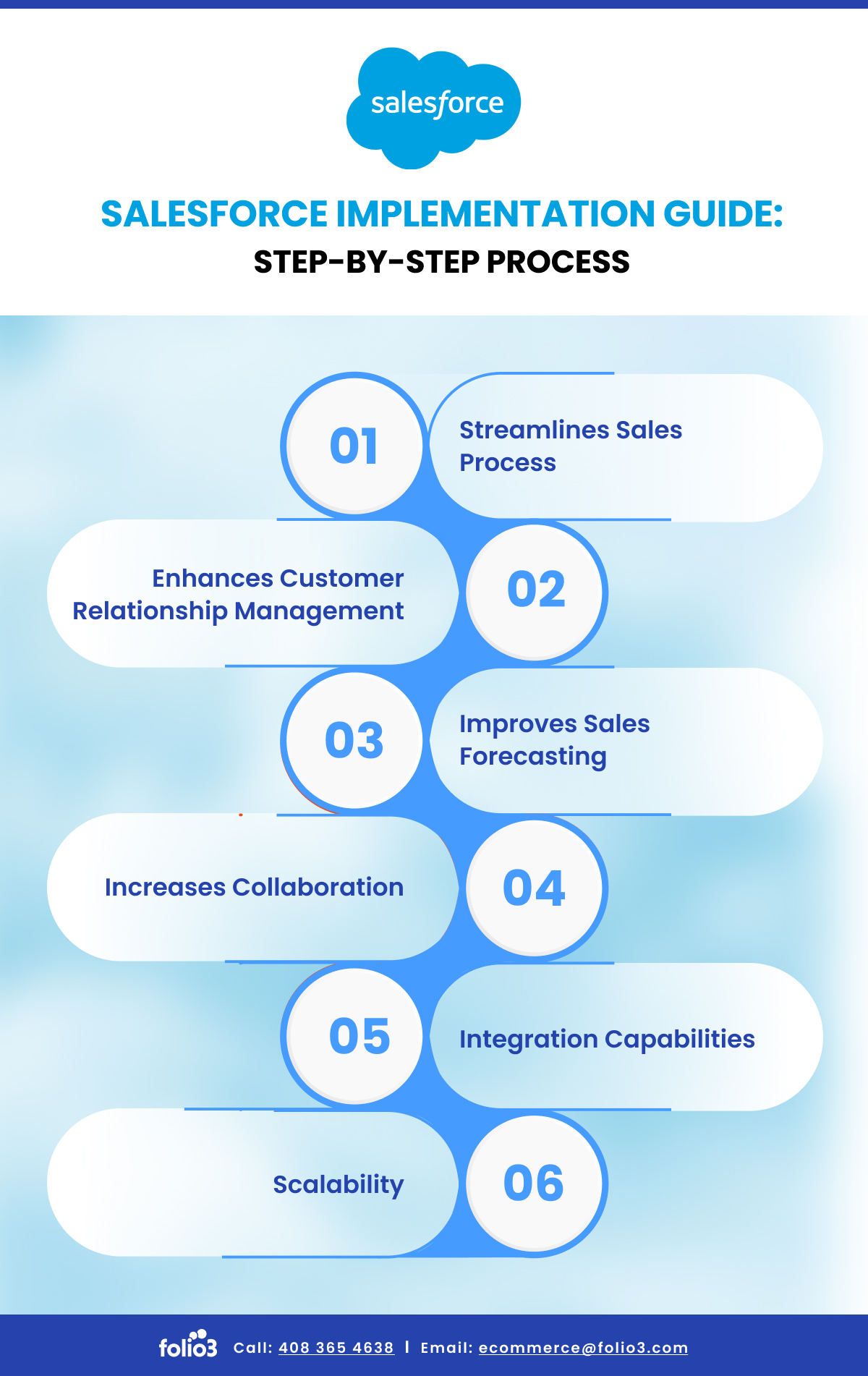As of January 2025, Salesforce Sales Cloud stands as an undeniable force in reshaping the landscape of sales. Its dynamic solutions that resonate with the evolving organizational needs are evident.
The active interface propels sales initiatives, paving the way for accelerated growth and stability. On the other hand, the consequences of neglecting the Salesforce Sales Cloud tool can hinder a business’s sales efficiency.
Without its streamlined tools, a company may struggle in many instances. To explore what Salesforce Cloud is, how it functions, and what are the benefits, let’s explore it in detail.
This blog aims to provide a comprehensive understanding of Salesforce Sales Cloud, bringing forth updated insights that reflect its current capabilities and relevance in the sales ecosystem.
What Is Salesforce Sales Cloud?
It is an advanced platform that transforms the way businesses work. The services aim to manage and optimize sales processes. To be more precise, Sales Cloud is a vital component of the Salesforce Customer 360 suite.
It has been designed to empower sales teams with deeper insights and efficiency. This innovative solution is known for integrating customer information, sales data, and communication channels. In short, it is fostering a productive approach to customer relationship management.
The best part of Salesforce Sales Cloud is that it goes beyond traditional CRM systems, which is why it offers a user-friendly interface. The sales teams can make result-oriented decisions and capitalize on features like lead management, opportunity tracking, and real-time analytics.
Moreover, the platform’s adaptability makes sure that businesses of all sizes can tailor it to their unique needs. No matter if it is just a startup or enterprise-level organization.
One of the key strengths of Sales Cloud Salesforce is its ability to provide a 360-degree view of each customer. By consolidating data from various touchpoints, sales professionals gain valuable insights into customer preferences and behaviors.
This facilitates not only personalized interactions but also enables predictive analytics to anticipate future trends.
Furthermore, the Sales Cloud improves communication among team members. The platform’s mobile capabilities empower sales representatives to engage with clients. Also, It epitomizes the evolution of CRM.
Benefits of Salesforce Sales Cloud
The benefits of Implementing Salesforce Sales Cloud implementation services offer a variety of advantages. Some of them are listed below:
Streamlines Sales Process
The cloud services of Salesforce Sales revolutionize the selling process by introducing automation and efficiency. Simply put, when it streamlines workflows, it reduces manual tasks and ensures a seamless progression from lead to deal.
This optimization makes sales teams focus on more significant. Ultimately driving productivity among them. Apart from that, they can now close the selling deals more effectively.
Enhances Customer Relationship Management
One of the best sides of using Salesforce Sales Cloud is that it gives a proper view of customer interactions. These clouds enhance customer relationship management by enabling personalized engagements.
Plus, anticipating needs and backing long-term loyalty fall under their duty. With 360-degree technology, businesses become eligible to form meaningful connections. As well as tailor their approach to every customer’s preferences.
Improves Sales Forecasting
Businesses can get real-time sales forecasting here as well. All thanks to the platform’s real-time analytics. They provide teams with accurate insights into performance and recent trends.
This data-driven approach not only benefits decision-making but also helps businesses to adapt strategies promptly. Above all, Improved forecasting enables them to anticipate market changes and capitalize on opportunities so that these informed decisions positively impact the bottom line.
Increases Collaboration
When it comes to collaboration, Sales Cloud takes the lead. It is great for the working environment by bridging the communication gap among team members. The platform facilitates assisting in sharing information.
This is to ensure that everyone is on the same page. Furthermore, enhanced collaboration leads to more benefits. Such as effective teamwork, cohesive approach, and innovative problem-solving skills to achieve sales goals.
Integration Capabilities
Another standout feature of Salesforce Sales Cloud lies in its integration capabilities. The platform can easily connect with various tools and applications, thereby creating a unified ecosystem.
This interconnectedness improves overall business operations in many ways. Such as centralizing data, reducing duplication of efforts, and ensuring efficient workflow across various departments.
Scalability
Scalability is a basic benefit of embracing Salesforce Sales Cloud services. The platform is proficient at adapting to the evolving needs of a business. Therefore, it is suitable for both startups and large enterprises.
With the growth of businesses, Sales Cloud scales to accommodate abilities like increased data, users, and functionalities. This quality makes sure that the platform remains a valuable asset in the long term. Overall, it supports organizational growth and productivity.
Steps to Implement Salesforce Sales Cloud Implementation Services
Here is how to set up Salesforce Cloud to attain maximum outputs.
1. User Setup and Performance
This begins by ensuring a smooth start, such as configuring user profiles, roles, and permissions. This step explains access levels and tailors Salesforce for individual needs. This also optimizes performance by setting up session settings, login policies, and password requirements.
2. Fine-tuning Salesforce Object
The next step includes the customization of Salesforce objects. So that they can get along with your sales processes. The modification of fields, page layouts, and record types are also useful to tailor user experience in this case. In essence, fine-tuning the platform matches your specific business requirements and streamlines the sales process.
3. Data Import
This step is essential in effectively migrating data into Salesforce Sales Cloud implementation services using data import tools. It involves mapping the fields accurately and cleaning and deduplicating data before import to ensure data integrity.
4. Basic Reporting Setup
The basic reporting step includes establishing a solid foundation for reporting. This is done by creating custom report types and dashboards. However, using filters, groupings, and charts also presents meaningful insights. But this also requires training users on generating and interpreting reports for informed decision-making.
5. Automation and Validation Rules
These rules are the secret behind productivity and data accuracy in workflow. Making this step an important part of the process builder. Data integrity using validation rules works best for successfully implementing the process. On the other hand, the regular review and refinement of automation processes helps to ensure efficiency and relevance.
6. Rollout Strategy
By planning a phased rollout, we can create a smooth transition. However, this approach demands training sessions for end-users and administrators. Secondly, the monitoring part of the feedback addresses issues promptly. So, a gradual introduction of the advanced features and integrations makes users familiar with the platform.
7. Post-Implementation Training
The training process is essential to make sure that your business gets the most out of Salesforce Sales Cloud. This involves training programs for both end-users and administrators. Moreover, it assists you with platform maintenance and troubleshooting.
8. Security and Compliance
This step involves ensuring the platform adheres to security and compliance standards. The configuration of settings, permission sets, and data encryption are crucial in this regard. Additionally, regular audits help maintain the integrity of sensitive business data.
9. Integration with Other Clouds
Salesforce Sales Cloud can integrate with other clouds, such as Marketing and Service Cloud. This allows for a seamless flow of data across all departments, enhancing collaboration and streamlining business processes.
10. Utilize AI and Analytics
It is essential to explore the AI and analytics capabilities of Salesforce Sales Cloud. This can help businesses gain valuable insights into customer behavior and trends, allowing for more personalized and targeted sales strategies.
11. Continuous Improvement
The implementation of Salesforce Sales Cloud is an ongoing process. It is essential to continuously review and improve processes, workflows, and integrations to ensure the platform remains relevant and effective in meeting business goals.
Best Practices for Smooth Salesforce Sales Cloud Implementation
Hire Salesforce Certified Sales Cloud Consultants
The first step toward implementing Salesforce is engaging certified consultants. These experts are equipped with the knowledge and skills needed to navigate the platform’s intricacies.
It is due to their proficiency that the implementation aligns with best practices. Eventually, the benefits of Sales Cloud will be maximized. Plus, minimizing potential pitfalls.
Streamline With Automation
Automation is required to further implement the Salesforce Sales Cloud process. Be it to Identify manual and time-consuming tasks. Or to leverage the platform’s automation capabilities to avoid redundancy. The method serves them all.
This not only enhances workflow efficiency but also frees up valuable time for sales teams so that they can focus on high-priority tasks.
Convert More Leads
A successful Sales Cloud implementation is not possible without optimizing lead conversion. It is no less than a key practice for it. The experts implement strategies to qualify and nurture leads effectively.
Moreover, they leverage the platform’s features to track lead interactions, prioritize high-value leads, and adapt personalized engagement tactics. Through this lead conversion, the platform often becomes a powerful tool for driving sales success.
Harness Data Insight
The next step to maximize the potential of the Salesforce Sales Cloud involves harnessing the power of data insight. They utilize the platform’s analytics technology to gain valuable insights, such as customer behavior, market trends, and sales performance.
Similarly, informed decision-making based on data analysis enhances strategic planning. Also, the adaptation of sales strategies fulfills competitive business needs.
Reduce Sales Rep Ramp Time
Accelerating the onboarding process for sales representatives is as critical as any other practice. Especially if there is a high demand for a smooth Salesforce Sales Cloud implementation partner, it is better to provide comprehensive training programs.
All this leads to a quicker alignment of sales teams into the platform. That is how to help the team contribute to the organization’s objective at an optimal pace.
Conclusion
To sum up, the Salesforce Sales Cloud platform offers the best possible user-friendly interface. The incredible features not only streamline tasks but also enable sales professionals to concentrate on other significant aspects. Like building valuable relationships and closing deals. Its updated features help Sales Cloud transform sales into a proactive endeavor.
Even though Sales Cloud stands as a beacon of efficiency, it is impossible without embracing the collaborative efforts of Salesforce Sales Cloud consultants.

Hasan Mustafa
Engineering Manager Salesforce at Folio3
Hasan Mustafa delivers tailored Salesforce solutions to meet clients' specific requirements, overseeing the implementation of scenarios aligned with their needs. He leads a team of Salesforce Administrators and Developers, manages pre-sales activities, and spearheads an internal academy focused on educating and mentoring newcomers in understanding the Salesforce ecosystem and guiding them on their professional journey.
